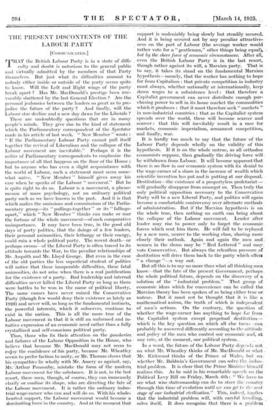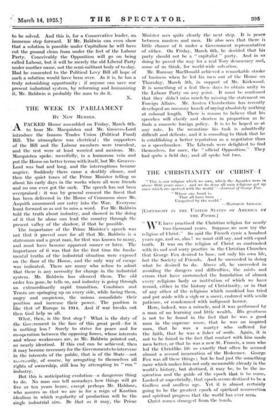THE PRESENT DISCONTENTS OF THE LABOUR PARTY
[COMM N ICATED.1 THAT the British-Labour Party is in a state of. diffi- culty and doubt is notorious to the general public and virtually :admitted by the members of that Party themselves. But just . what its difficulties amount to nobody either inside or outside of the party seems quite to know. Will. the Left and .Right wings of the party break apart ? Has Mr.. MacDonald's prestige been irre- vocably shattered by. the last General Election ? Are the , personal jealousies between the leaders so great as, to pre- judice the future of the party ? And finally, will the . Labour star decline and a new day dawn for the Liberals ?
These are undoubtedly questions that are in many people's minds. They give rise to the kind of statement . which the Parliamentary correspondent of the Spectator made in his article of last week. " New Member " wrote : " If -the Parliamentary Labour. Party. cannot pull itself together the revival of Liberalism and the collapse of the . Labour movement are inevitable." Perhaps it is the 9n6tier of Parliamentary correspondents to emphasize. the . importance of all that happens on the floor of the House ; but to anyone who has even a slight acquaintance with the world of Labour, such a statement must seem some- what naive. " New Member " himself gives away his case when he speaks of the Labour " movement." But he is quite-right to do so. Labour is a movement, a pheno- menon of mass psychology, not an ordinary political party such as we have known in the past. And it is that which makes the omissions and commissions of the Parlia- mentary group—its " pullings-together " or its " fallings- apart," which " New Member " thinks can make or mar the fortune of the whole movement—of such comparative unimportance. It may • have been true, in the good old days of party politics, .that the doings of a few leaders, their personal animosities, their lethargy or their energy, could. ruin a whole political party. The recent death—or perhaps swoon—of the Liberal Party is often.traced to its attitude towards the War, to the peculiar relationships of . Mr. Asquith and Mr. Lloyd George. But even in the case of the old parties the less superficial student of politics will notice that these insuperable difficulties, these fatal animosities, do not arise when there is a real justification for the existence -of a party. Bad leadership and internal difficulties never killed the Liberal Party so long as there were battles to be won in the name of political liberty. The same causes have never ruined the Conservative Party (though few would deny their existence as lately as 1923) and never will, so long as the fundamental instincts, the powerful interests, which it subserves, continue to exist in the nation; This is "all the more true of the Labour movement in that it• is still an unformed and in- tuitive-expression of an economic need rather than a fully crystallized and self-conscious political .party. Thus, those who fix their attention on the gaucheries. and failures of'the Labour Opposition in the House, who • believe that because Mr. - MacDonald .may: not seem to_ enjoy the confidence of :his .party, because Mr. Wheatley, seems to prefer faction to'unity, or Mr. Thomas shows that his sympathies-lie wholly with Mr. Amery as against, say,: Mr.---Arthur -Ponsorrby,. mistake the form of the modern. Labour-movement for the substance.- It is not, in the last resort; these• men; • though, of -course, they can immensely clarify or .confuse its shape, -who are directing the fate of the- Labour movement.- It is rather the .ordinary indus- trial- wage-earner who can and will do so. With his whole; hearted support, the Labour movement would become a, dominating force in the country. And at the moment that support is undeniably being slowly but steadily secured. And it is being secured not by any peculiar attractive- ness on the part of Labour (the average worker would rather vote for a " gentleman," other things being equal), but by the sheer, force of economic circumstances. After all, even the British Labour Party is in the last resort, though rather against its will, a Marxian party. That is to say, it takes its stand on the fundamental Marxian hypothesis—namely, that the worker has nothing to hope for from Capitalism : that private competition in industry must always, whether nationally or internationally, keep down' wages to a subsistence level : that therefore a Capitalist government can never distribute enough pur- chasing power to sell in its home market the commodities which it produces : that it must therefore seek " markets " in non-industrial countries : that as the Capitalist system spreads over the world, these will become scarcer and scarcer : that this will inevitably result in a race for markets, economic . imperialism, armament competition, and finally, war.
It is hardly too much to say that the future of the Labour Party depends wholly on the validity of this hypothesis. If it is on the whole untrue, as all orthodox economists suppose, then gradually the driving force will be withdrawn. from Labour. It will become apparent that there is no flaw in our economic system with its denial to the wage-earner of a share in the increase of wealth which scientific invention has put and is putting at our disposal.
Destitution7----the existence of a propertyless proletariat— will gradually disappear from amongst us. Then truly the only political opposition necessary to the Conservative Party will be a new Liberal Party, and politics will again become a comfortable controversy over alternate methods of administration. But if the Marxian hypothesis is on. the whole true, then nothing on earth can bring about the collapse ,of the Labour movement. Leader ,after leader may rise to power only to forget the economic , forces which. sent him there. He will fall to be replaced by a new man, nearer, to the working class, sharing more closely their outlook. Again and again the men and women in the slums may be "_ Red Lettered " and may vote Conservative. But always the relentless pressure of destitution will drive them back to the party which offers " a change "—a way out. _ But all this is to say no more than what all thinking men know—that the fate of the present Government, perhaps. the whole political future, depends on the 'discovery of a solution of the " industrial problem." That group of economic ideas which for convenience can be called the. Marxian theory has been spoken of as being.either true or untrue. But it must not be thought that it is like a. mathematical axiom, the truth of which is independen( of men's actions. On the contrary, the question of, whether the wage-earner has anything to hope for from the Capitalist system except perpetual, destitution7-- which is the_ key question ,on which all else turns-can.probably be answered differently according to the attitude and policy of the men who control our econornic,and, at any rate, at .the moment, our political_ system.
In a word, the future of the Labour Party.dcpmda not on what Mr. Wheatley thinks of :Mr. MacDonald or what Mr. Kirkwood thinks of. the. Prince -of Wales, but on, whether Mr. Baldwin's Government can solve the-indus71 trial problem. It is clear that the Prime Minister himself, realizes this. As he said in his remarkable speech on .the Political Levy. Bill on Friday, March .6th :..!` We have...to see what wise statesmanship can do to steer the country through this time of evolution until Eve can get to tiv next stage of.our industrial civilization." This; indeed, implies that the industrial problem will, with careful handling,. solve itself. It does recognize that there is ..a problem to be solved. And this is, for a Conservative leader, an immense step forward. If Mr. Baldwin can even show that a solution is possible under Capitalism he will have cut the ground clean from under the feet of the Laboiir Party. Conceivably the Opposition will go on being called Labour, but it will be merely the old Liberal Party under another name, not the semi-militant body of to-day. Had he consented to the Political Levy Bill all hope of such a solutiOn would have been over. As it is, he has a truly astonishing opportunity ; if anyone can save our present industrial system, by reforming and humanizing it, Mr. Baldwin is probably the man to do it.
X.















































 Previous page
Previous page